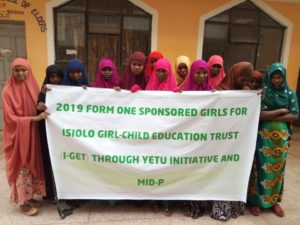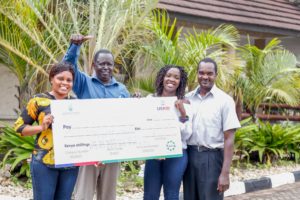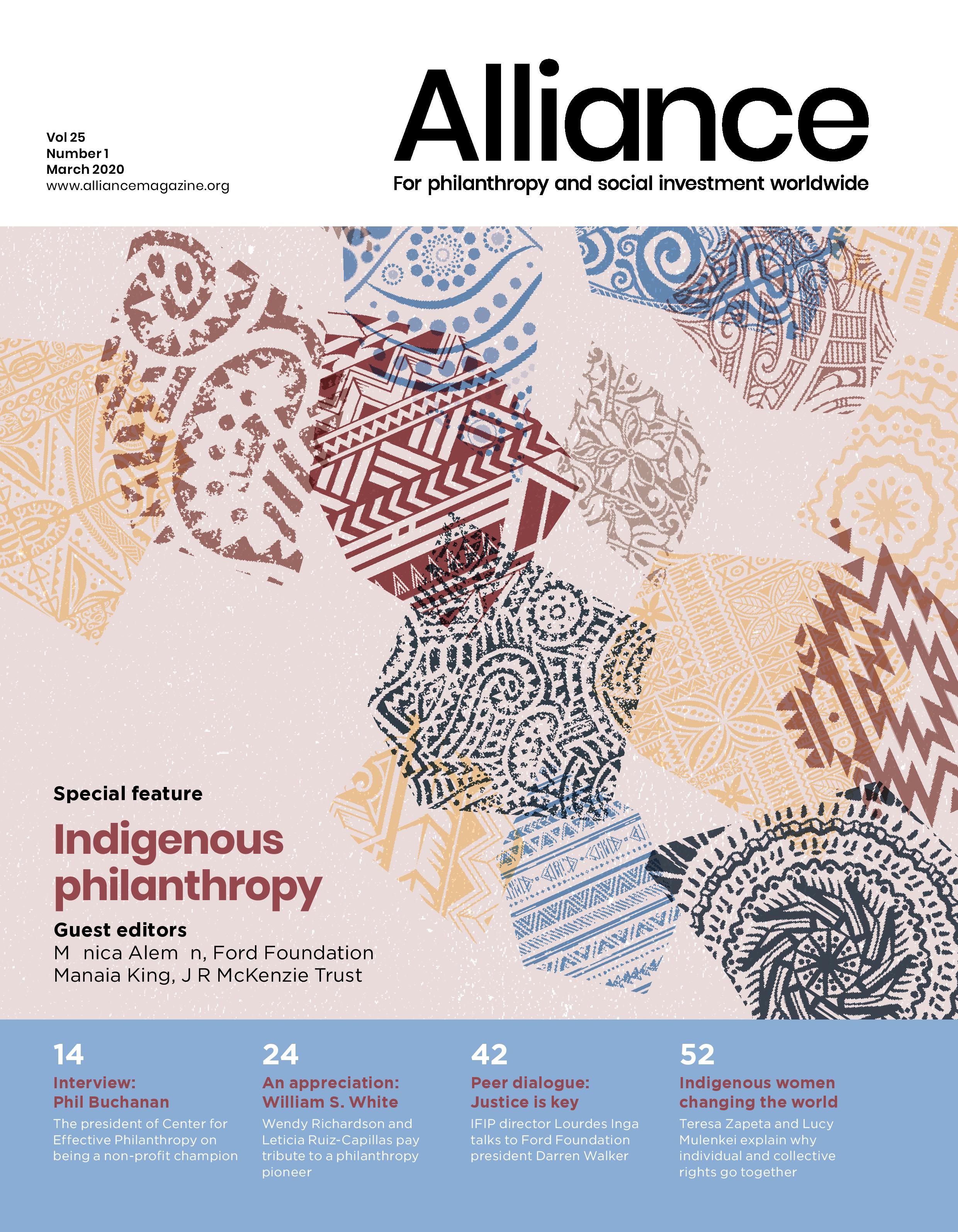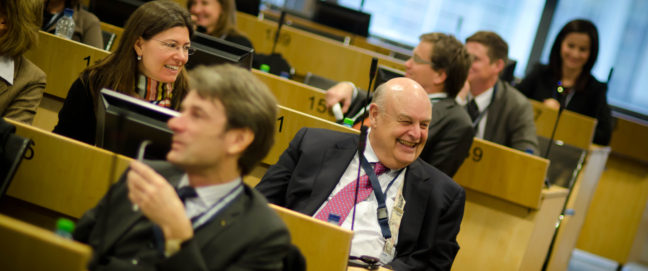Attracting local donors can pay big dividends – more than just financial ones – and it’s not just about wealthy donors, either
The Merti Integrated Development Programme is based in Isiolo, a town in northern Kenya on the road to the Ethiopian border. Since its founding in 2000, Merti has supported over 300 adolescent girls to complete their education. This has opened up new possibilities for marginalised girls whose opportunities have traditionally been very limited.

Girls from Isiolo sponsored to attend school through a local Yetu fundraising initiative.
Like many other organisations in Kenya, Merti was formed with support from foreigners who visited Kenya and identified a way in which they could help, in this case a group of pensioners from Eindhoven in the Netherlands. By 2017, however, many of these pensioners were in their 80s and 90s and were no longer able to bankroll the organisation. Through Yetu, an initiative jointly funded by USAID and the Aga Khan Foundation (AKF), Merti turned its attention to local philanthropy for support, emphasising relevance and value to local stakeholders. Through these efforts, Merti raised $53,000 from local financial and in-kind donations. Moreover, the Isiolo county government pledged 10 per cent of its County Development Fund to the organisation on an annual basis.
If our goal is to enable more strategic local philanthropy through CSOs, a key concern is how this might affect giving to urgent individual needs.
Stories like this were in abundance at a pair of workshops held in London and Nairobi last October, convened by AKF in collaboration with Charities Aid Foundation, the Charles Stewart Mott Foundation and the UK National Lottery Community Fund. The goal of the workshops was to launch a joint research study exploring the potential of local philanthropy to meet local development needs in eastern and southern Africa.
This is a natural fit for AKF. We have played a key role in setting up organisations that promote local philanthropy in Afghanistan, Pakistan and East Africa, and we also mobilise and track community contributions to local development across our portfolio. Research efforts such as this one help us identify where and how to invest our time and resources to enhance local philanthropy in the future.
The generosity of East Africans
Local philanthropy doesn’t just mean the giving of the most wealthy individuals. The emerging middle class, and even the poorest communities, can give generously to local causes, as the early findings from the East African research bear out. The average Ugandan gives 31 per cent of family income to charitable causes (the figures for Tanzania and Kenya are 24 and 22 per cent respectively). Between 98 and 100 per cent of people interviewed in all three countries indicated that they have given informally within the past 12 months. And, over 90 per cent of East Africans interviewed said that their generosity did not make it difficult for them to make ends meet.
The research also explored giving in support of local civil society organisations (CSOs), defined in this case as non-governmental organisations – like Merti Integrated Development – that exist to serve the public good through the promotion of health, education, human rights, climate change adaptation, early childhood development, food security and other socio-economic needs.
In order to obtain resources locally, CSOs need to reach out to stakeholders in government, business and the community.
Our findings indicate that although the primary mode of giving in all three countries is cash directly to individual family members, giving to CSOs represents a significant portion of local generosity. In all three countries, between 62 and 64 per cent of respondents indicated that they had given to a CSO within the past year. Organisations are primarily chosen based on personal attachment to the causes that they serve. Modes of giving to civil society organisations vary across the three countries, however. In Uganda, the primary means is monetary followed by in-kind donations. In Kenya, monetary donations are complemented by volunteering. In Tanzania, in-kind donations are the most common followed by monetary contributions.
Reactions to the new research
Immediate reactions in the London and Nairobi workshops to the research findings included the following: firstly, we already knew from CAF’s World Giving Index that East Africans were generous in their support of charitable causes, but had not necessarily understood the magnitude of their generosity. Second, while the primary form of giving is directly to individuals in immediate need is not surprising, the extent and frequency of support to local CSOs is higher than we had appreciated. Third, and with this in mind, it is somewhat surprising that these organisations continue to focus so heavily on foreign grant funding. Finally, if our goal is to enable more strategic local philanthropy through CSOs, a key concern is how this might affect giving to urgent individual needs – such as food for the hungry, shelter for the homeless, or school fees for children who might otherwise drop out.
Both the Nairobi and London participants committed to identifying ways to enhance the systems that enable, and the outcomes that are generated through local philanthropy.

Merti was rewarded by Yetu for being top CSO in local fundraising.
Changing local relationships and attitudes
Drawing upon my own experience of local philanthropy around the world, I have some final reflections.
Local philanthropy can be a key driver of social capital and collaboration between CSOs and other local stakeholders. In order to obtain resources locally, CSOs need to reach out to stakeholders in government, business and the community. This requires learning and practising very different forms of communication than those used to engage foreign donors. Even where these new local relationships don’t lead to resource mobilisation, they can generate social capital that facilitates long-term collaboration in response to development challenges.
Choosing local CSOs means donors are more likely to find themselves supporting organisations that are truly rooted in, and responsive to, the communities in which they operate.
CSOs are most accountable to those from whom they receive resources. This is why we hear concerns about them being more responsive to external donors than the communities they serve. When the providers of resources are local, community members, local governments and businesses become co-owners of the organisation, often with increased expectations and greater investment in the organisation’s success. The dynamics of local development shift in powerful ways when even the poorest community members change from seeing themselves as an organisation’s beneficiaries, to becoming its donors.
It is unlikely that local contributions will entirely replace overseas funding for many local CSOs, but even so, local giving can be incredibly influential. In my experience, even a small increase in local funding can have a significant impact upon an organisation and the way in which it operates. An organisation that moves from 1 per cent to 20 per cent local funding is 20 times more accountable to local stakeholders and 20 times more able to push back against unreasonable donor demands. Moreover, choosing local CSOs means donors are more likely to find themselves supporting organisations that are truly rooted in, and responsive to, the communities in which they operate.
Coming back to where we began, as a result of the efforts of the Merti team, today the organisation is more accountable to its local donors and stakeholders and has a long-term sustainability plan that includes local fundraising. Critically, through this process, the organisation’s locus of power has shifted from Eindhoven to Isiolo.
Stories like Merti’s are increasingly common, but there is still an important role for groups like AKF to play in supporting localisation in development, enabling communities to benefit from increased agency, accountability and adaptability.
Matt Reeves is global lead, civil society at the Aga Khan Foundation.
Email matt.reeves@akdn.org
Twitter @matt_w_reeves






Comments (0)